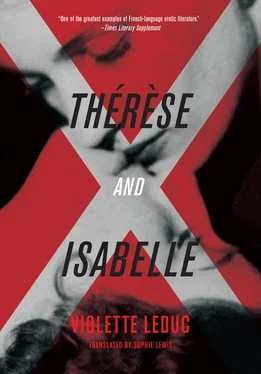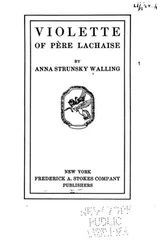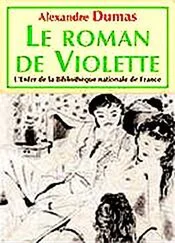Perhaps we could say that she experiences herself more as a member of a counterpublic than as a member of a public for the literature she explores. She is unable to relate to it in mainstream ways. She is too poor, too uncultivated, too young, too enthusiastic a reader to approach literature appropriately. Her reading is intermingled with other sensual experiences (cigarettes and the smell of shoe polish among them) in a way that enhances her sense of its illicitness. She, like many other alienated young people, often people exploring nonnormative sexual experiences, develops an affiliation with Gide’s The Fruits of the Earth , a kind of countercultural classic of the early to mid twentieth century, with its call to a certain kind of sexual dissidence, to an experience of fervent sensuality.
Once she becomes a published writer, Leduc’s relationship to bookstores takes on a different, more anxious cast. Here is a scene described in Mad in Pursuit that took place shortly after the publication of L’Asphyxie in 1946, a book that received only meager and unkind critical notices despite an excerpt having been published in Sartre’s celebrated journal, Les Temps Modernes , and despite having appeared in a collection edited by Albert Camus:
One afternoon I was preparing an assortment of vegetables to make my soup, a wild hope seized me, the knife fell onto my one sad leek. I threw on my clothes. The journey to rue de Bac station was interminable. I arrived in front of the Gallimard bookstore on the Boulevard Raspail, in front of its eclectic windows, completely out of breath. But it must be in them. It wasn’t. The large-format books, the rare editions of Valéry, of Gide, of Apollinaire, disdainful and withdrawn, rejected me utterly. The bastions of modern literature cannot be overthrown just to make way for your little pile of turds. Oh God, how I begged outside those windows. . If I had only been sure of what I was writing, I should have been saved. . Baudelaire and Rimbaud, were they sure of themselves? But I wasn’t Baudelaire, I wasn’t Rimbaud. Ten new books published every day. How can you expect them to display such a flood? An hour, even if it were just for an hour, each of us in turn. . Where has it gone since I dedicated all those copies? Where has it gone to earth? Have the bookstores received it? I should die of shame if I had to ask them. Writing must be a sin, or why should I prefer to conceal it? My guilt was coming back. Window displays and bookstores whispered to me in the night: “You’ll never amount to anything, you’ll never amount to anything at all,” just as my mother had once dinned those words into me in the past. I shall hand in my cards. Hand in your cards to whom? To the bookstores, to their windows, to the publisher. (1999, 72)
Perhaps foolishly, Leduc grants the window of the bookstore run by the publishing house Gallimard a particular kind of sacredness. Given how many famous authors Gallimard published, it was probably unreasonable to expect to find her own first book on display. And yet how is a new, idiosyncratic author of Leduc’s ilk ever to find readers? Idiosyncratic books by idiosyncratic authors often circulate by word of mouth, developing small communities of highly partisan readers. Leduc already knew that this was the case for her first book, as she reveals a bit earlier in the same passage from Mad in Pursuit :
My cheeks still wet with tears, I ran into the antique dealer Hagnauer, who was only too delighted to give me the news that Cocteau had read my book and was telling everyone else to read it. Encouraged, I walked round for hours and hours. I had developed a method: that of the bird’s nester. I slowed down when I was twenty yards away from the bookstore, then I stole up on it very gently so as to surprise my book in the window and receive a shock from it. But all the nests were empty. Except once. Where? The dispiriting window of the Polish bookstore on the Boulevard Saint-Germain. How old and worn it looked in the very back row! If I buy it from them, then they’ll take it out of the window; if I buy it from them, it will become a dusty rectangle after I leave. I looked at it for a long time. (71–72)
Cocteau helped her book find readers in informal ways; its formal place in bookstores remained highly tenuous. Leduc knew that at the time Jean Genet’s books circulated in a similar way: Genet’s Miracle of the Rose was recommended to her by Simone de Beauvoir, but was not a text that was easy to find. It only existed in a hand-printed, 475-copy edition published by a small publishing house called Arbelète. De Beauvoir promised Leduc she would leave her copy of the novel for Leduc with the cashier at the Café des Deux Magots:
The lady at the desk of the Deux-Magots handed me the copy of Miracle de la Rose Simone de Beauvoir had left there for me. It’s heavy, I commented. Yes, it’s heavy, the lady at the desk replied. . That evening Miracle de la Rose weighs down my bed. The book is inside a chest, between two covers that fit together. I have brought a deluxe edition home with me: it’s a first. . The size and weight are almost those of a Bible at the foot of a pulpit. They require a lectern, special arrangements. I lean my elbow on the pillow, we tilt, the book and I together, towards the wall, and we begin to give ourselves to one another. I am falling into my reading of Miracle de la Rose as one falls in love. (74)
Genet’s book comes to Leduc through unofficial channels, we might say, and her reading of it resembles her youthful reading of Gide’s The Fruits of the Earth, involving a combination of secrecy, sensuality, and sacredness. There is a lesson to be learned about the combination of these two phenomena, unofficial modes of circulation and a certain kind of fervent reading: they link both Genet and Leduc to what we might call a sexual counterpublic, a very specific kind of readership with a correspondingly particular kind of authorship and a particular experience of reading. Perhaps prominent display windows of imposing bookstores are not the most hospitable homes for books seeking that kind of readership, or offering that kind of experience.
Leduc’s early work, with all the difficulties of its style, its subject matter, and its way of perceiving and thinking about the world, comes to be admired by much the same set of people who admired Genet’s early work. The book-collecting industrialist Jacques Guérin would even arrange for the publication of a private, luxury collector’s edition of L’Affamée , similar to the private editions of Genet’s early novels. It was, in fact, in the form of this private edition that Leduc’s book would find itself where she had dreamed it would be. As her biographer Carlo Jansiti notes, the private edition “comes off the presses in September 1948. Paul Morihien, rue de Beaujolais, dedicates a window to it” (Jansiti 1999, 210); Morihien was also the publisher of the private edition of Genet’s Our Lady of the Flowers. The more affordable Gallimard edition of L’Affamée , published a few months later, sold poorly.
Unlike Genet, Leduc was slow to find a wider readership. De Beauvoir’s understanding of why Leduc’s Ravages was censored more rigorously than anything by Genet ever was is simple and convincing: the men who chose what to publish, the men who reviewed what was published, the men who demanded that this or that passage be censored were made uncomfortable by the idea and by the example of a woman finding a vibrant new language in which to explore instances of female same-sex sexuality (the topic of Thérèse and Isabelle ), or to recount the experience of a botched abortion, or to describe bemusedly what it is like to handle a penis during a taxi ride. Yet, there is perhaps more to be understood about the difficulty Leduc has had finding readers, the slowness with which they have found their way to her writing. Perhaps there is a kind of complexity to the reading experience she offers that has been difficult to take in, perhaps there is a complexity to her exploration of the way sexual experience is constructed, and to the way sexual and literary experiences intermingle that have been difficult to access. What to do? Find more of her books and make special arrangements to read them: polish your shoes, hide under the sheets with her books, display her books wherever likely readers might find them. Speak to others fervently about your obsession, about the unsettling complexity of the sexual and literary experiences that Violette Leduc offers.
Читать дальше











